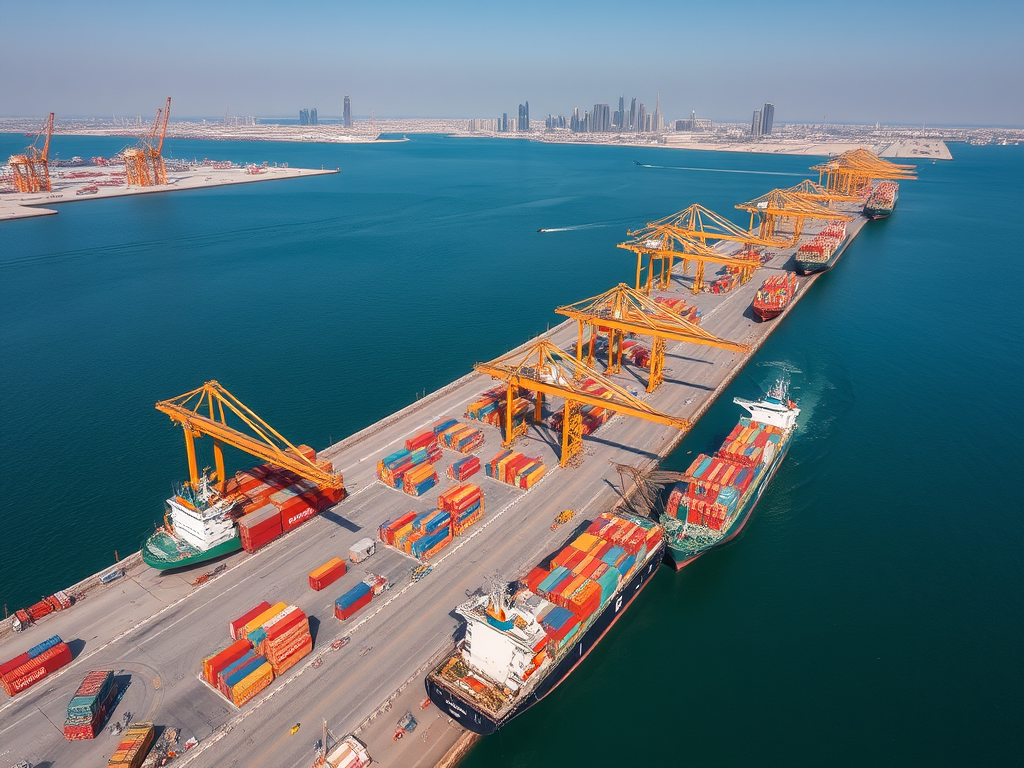Dubai is not just a shimmering oasis in the desert; it has transformed into a bustling international trade hub, captivating businesses around the world. Its unique geographic positioning, combined with robust infrastructure and favorable economic policies, sets the stage for unparalleled access to both emerging and established markets. This attractive milieu has lured countless multinational corporations to set up shop in this thriving metropolis, leveraging its strategic advantages. With a diverse and skilled workforce, Dubai stands at the forefront of international commerce. The city serves not just as a regional player but as a global gateway, facilitating trade between continents with unparalleled efficiency. In the pages that follow, we will delve deeper into the key elements that make Dubai a beacon for trade on the international stage.
The Geographical Advantage of Dubai

In terms of geography, Dubai holds a trump card. Nestled at the crossroads of Europe, Asia, and Africa, the city provides an optimal point for global commerce that is hard to rival. This geographical advantage allows for quick and efficient redistribution of goods to major markets, minimizing transit times and costs. The ease of access to destinations across these three continents bolsters Dubai’s role as a logistics hub and trade center. Every day, goods from various corners of the globe find their way to Dubai’s shores, creating an intricate web of commerce. Consequently, businesses can operate seamlessly, responding to demand with speed and agility.
The geographical positioning of Dubai allows businesses to cater to diverse markets with relative ease. Just a few hours’ flight away from major cities across Europe, Asia, and Africa, Dubai serves as a crucial gateway for trade. This invites multinational organizations to set up their regional operations in the city, knowing they can efficiently reach target markets. In this age of fast-paced commerce, the ability to respond quickly to market demands has never been more critical. Moreover, Dubai benefits from a favorable time zone, bridging the gap between East and West for efficient business operations. The result is a vibrant business ecosystem that continually fosters international trade.
World-Class Infrastructure

Infrastructure serves as the backbone of trade, and Dubai does not fall short in this respect. The city boasts modern airports and seaports equipped to handle global logistics. The integration of road networks further enhances the trade capabilities of this bustling metropolis, ensuring that goods can move swiftly from one point to another. Key to this infrastructure is the Dubai International Airport, recognized as one of the busiest airports in the world. It facilitates extensive flight connections that keep the world ever closer to Dubai’s thriving marketplace. Additionally, with high-tech facilities in place, trade operations are executed with exceptional efficiency.
Dubai International Airport
Dubai International Airport stands as a monumental asset in the repertoire of Dubai’s trade facilitation tools. With its expanded capacity and rapid customs processes, the airport allows for quick turnaround times for cargo shipments. The blend of amenities and services tailored for international trade demonstrates the city’s commitment to being a global trade nexus. Businesses can benefit from the airport’s extensive connections to over 260 destinations worldwide. This ensures that goods can be dispatched to and from Dubai seamlessly. Additionally, the airport supports a logistics community that includes freight carriers, shipping firms, and specialized service providers to streamline operations.
Jebel Ali Port
Another vital component of Dubai’s trade infrastructure is Jebel Ali Port, renowned as the largest man-made harbor in the world. This port specializes in cargo handling and distribution, significantly boosting Dubai’s maritime trade. With state-of-the-art facilities, it serves as a primary hub for container shipping companies. The port’s advanced technology enables efficient cargo processing, further solidifying Dubai’s global positioning. In fact, Jebel Ali Port contributes nearly 20% to Dubai’s GDP. Moreover, its proximity to the city ensures that logistics remain efficient and costs remain low for businesses.
Economic Free Zones and Trade Agreements
Dubai has strategically established numerous economic free zones, each designed to cater to different industries. These zones create a business-friendly environment that encourages foreign investment, allowing businesses to flourish. The advantages set forth in these free zones include tax benefits, complete foreign ownership, and simplified corporate regulations that entice international businesses to set up operations. The following benefits exemplify what these economic hubs offer:
- 100% tax exemptions on corporate or personal income.
- No restrictions on capital repatriation.
- Easy registration and licensing processes.
Furthermore, Dubai’s government has entered into several strategic trade agreements with countries worldwide to bolster its role as a trading powerhouse. With fewer trade barriers and preferential access terms, these agreements enhance the city’s attractiveness to foreign investors. The combination of free zones and robust trade agreements enhances operational flexibility, allowing businesses to thrive in a dynamic market environment.
Important Trade Agreements
| Agreement | Countries Involved | Benefits |
|---|---|---|
| GCC Economic Agreement | Bahrain, Kuwait, Oman, Qatar, Saudi Arabia | Tariff reductions and improved trade flows |
| FTA with India | United Arab Emirates, India | Reduced tariffs and enhanced market access |
| EU Free Trade Agreement | European Union | Improved trade relations and regulatory harmony |
Trade agreements like these create a favorable business landscape, making it easier for companies to penetrate diverse markets while minimizing costs. The strategic foresight exercised in establishing these agreements emphasizes Dubai’s commitment to becoming a leading international trade hub.
Cultural Diversity and Workforce
Cultural diversity contributes substantially to Dubai’s status as a trading center. With a workforce comprised of various nationalities, Dubai cultivates an environment that embraces global collaboration. This unique blend of cultures fosters innovation and creativity, elements that are vital for any competitive business environment. The presence of multilingual professionals helps businesses navigate cultural and linguistic barriers, promoting smoother negotiations and transactions. Moreover, the diverse workforce aids in understanding market trends and consumer behaviors across numerous regions. As a result, international enterprises have the capacity to tailor their strategies effectively, ensuring better engagement within the local market.
The significance of a multilingual workforce cannot be overstated in a global market. In Dubai, professionals fluent in English, Arabic, and other languages provide businesses with the tools they need to cater to a diverse customer base. This facilitates easier communication not only within the workplace but also with clients and partners across borders. The multicultural environment of Dubai attracts talent from around the globe, making it easier for firms to recruit specialized skills. Ultimately, this linguistic and cultural diversity enhances overall business efficacy and market adaptability, ensuring that companies thrive in a continuously evolving marketplace.
Conclusion
To conclude, Dubai’s strategic location, remarkable infrastructure, and favorable economic policies make it an unparalleled center for international trade. The importance of its geographical advantage is further enhanced by world-class transportation systems and economic incentives. Cultural diversity brings an additional layer of innovation that enriches the business environment. As global trade continues to develop and evolve, Dubai is strategically positioned to remain a dominant force on the world stage. By leveraging its geographical gifts and fostering business-friendly policies, Dubai is not just welcoming businesses—it’s paving the way for a global trade future.
Frequently Asked Questions
- What makes Dubai’s location strategic for trade? Dubai is positioned at the crossroads of Europe, Asia, and Africa, allowing for easy access to emerging and established markets.
- How does Dubai’s infrastructure support international trade? Dubai boasts advanced airports and ports, such as Dubai International Airport and Jebel Ali Port, which facilitate efficient logistics and cargo handling.
- What are economic free zones, and how do they benefit trade? Economic free zones in Dubai offer tax exemptions, foreign ownership, and streamlined regulations, making it easier for international businesses to operate.
- Why is cultural diversity important for trade in Dubai? A multicultural and multilingual workforce helps businesses navigate different cultures and languages, promoting smoother trade relations.